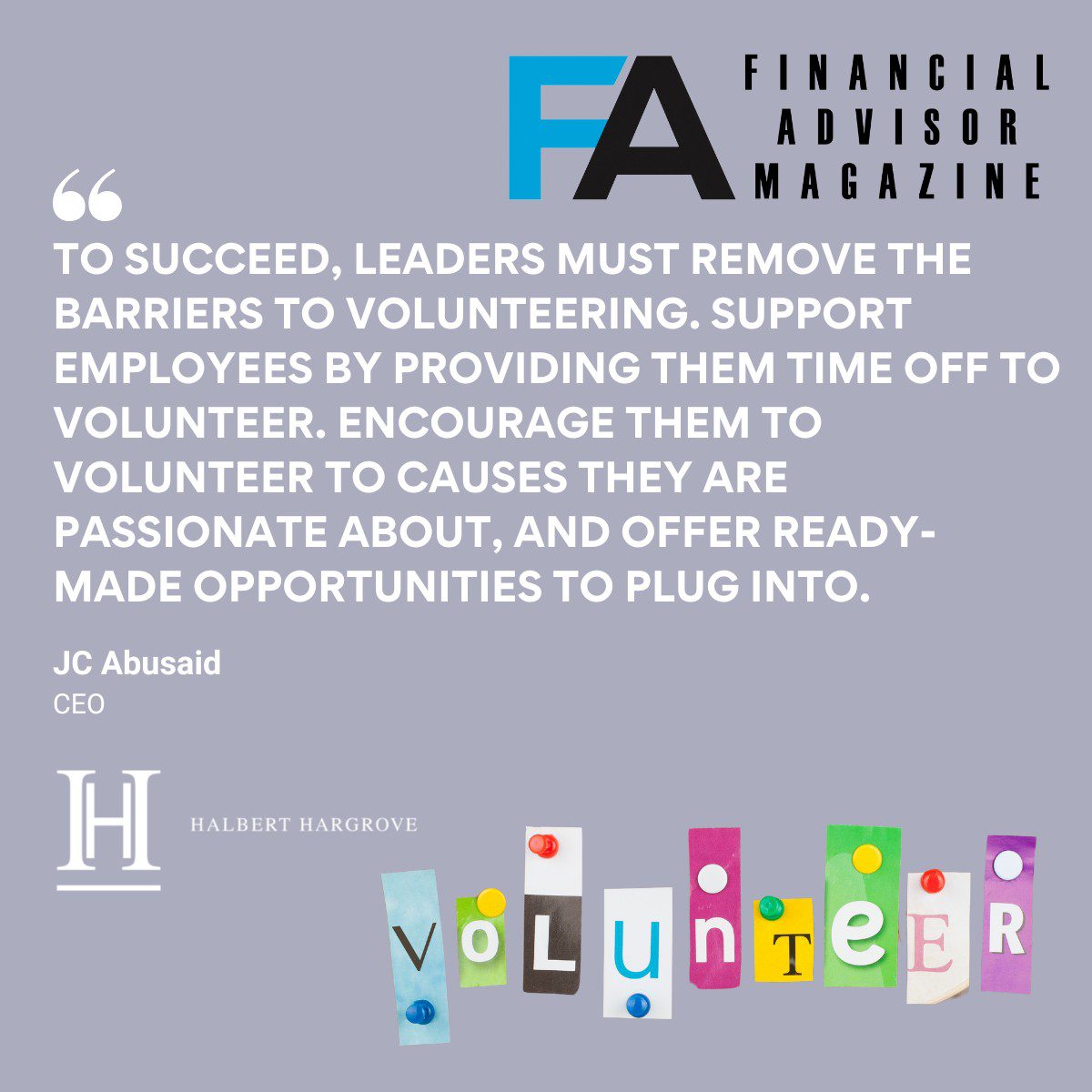By JC Abusaid, CEO/President as featured in Financial Advisor Magazine
Over two thousand years ago—before the advent of technology, the 9-5 workweek, and dizzying social calendars—Greek philosopher Theophrastus said, “Time is the most valuable thing a man can spend.”
How true he was. Busyness culture, time poverty—whatever you call it, working professionals have a lot of competition in their schedules. But as we know far too well, not every activity is weighted equally.
Wealth managers are particularly strapped for time, often working upwards of 50 hours per week. But there’s good reason to reevaluate our working days to devote more service to others, particularly as we advance in our careers. Ninety-two percent of human resource executives agree that contributing to a nonprofit can improve an employee’s leadership skills.
So much of what I learned about leading a wealth management firm came from my former boss, Halbert Hargrove’s Executive Chairman, Russ Hill. While juggling an incredible responsibility as head of the firm for over four decades, Russ was always fully committed to organizations and causes he cared deeply for: two terms as chair of the Long Beach Memorial Medical Center, Community Hospital of Long Beach and Miller Children’s Hospital Governing Boards, chairman of the Advisory Council for the Stanford Center on Longevity, co-founder of William Hill Winery and countless others.
At first, I candidly didn’t understand his philosophy or approach. Still, I have always been in awe of his commitment to giving back and the rich tapestry he wove into the Halbert Hargrove company culture around community service, which endures today.
It’s likely time for your RIA to reconsider community service and its potential impact on your firm. Here are some things I’ve learned from Russ over the years.
View Volunteering Through The Lens Of Career Building
What do our colleagues care about? While we might know a bit about their families and coffee orders, understanding their backgrounds and personal passions can help us gain a deeper understanding of the people we spend a great deal of our lives with.
When firms take an intentional and strategic approach, volunteering can be custom-built to suit the interests of every employee. Even better, while we know that volunteering provides many benefits for those in need, it also provides ample benefits for the volunteers and their employers, such as fostering a stronger company culture and employee engagement. A Deloitte Impact Survey found that 77% of nonprofits believe skilled volunteers could improve their organization’s business practices.
Volunteering pays it forward, too. According to a study performed by Career Builder, those who volunteer regularly have a 27% better chance of gaining employment, and 60% of hiring managers see volunteerism as a valuable asset when making recruitment decisions. It’s no secret why volunteering has become a standard section of resumes and award applications.
Implement A Culture Of Giving Back By Removing The Barriers
As Russ demonstrated, implementing a culture of giving back starts at the top. He built our firm by prioritizing service as a necessity, not a nice to have. As senior leaders, it’s up to us to show up and set the stage for what a civically oriented organization looks like.
We can’t boil the ocean, so creating a process for evaluating and practicing in community projects is helpful. Our firm has a checklist that measures against our core values, and we review it whenever a service opportunity presents itself to ensure alignment. Then, our internal governance committee votes on it. The process keeps things orderly.
To succeed, leaders must remove the barriers to volunteering. Support employees by providing them time off to volunteer. Encourage them to volunteer to causes they are passionate about, and offer ready-made opportunities to plug into. Celebrate their involvement in team meetings, internal emails, social media, and your website.
Rethink what generosity means. You don’t have to be wealthy to give back to your community. In fact, it has nothing to do with money; it’s about identifying the causes your firm and its employees are passionate about and finding ways to get involved. Writing a check is easy; giving your time and energy is invaluable.


